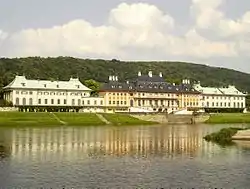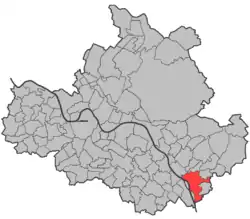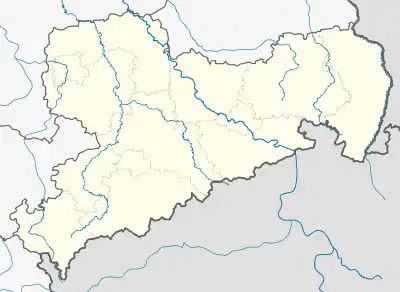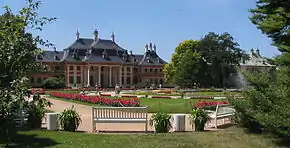Pillnitz | |
|---|---|
 Pillnitz Castle and river Elbe | |
Location of the quarter of Pillnitz in Dresden  | |
  | |
| Coordinates: 51°00′46″N 13°52′22″E / 51.01278°N 13.87278°E | |
| Country | Germany |
| State | Saxony |
| District | Urban district |
| City | Dresden |
| Borough | Loschwitz |
| Population (2020-12-31)[1] | |
| • Total | 3,392 |
| Time zone | UTC+01:00 (CET) |
| • Summer (DST) | UTC+02:00 (CEST) |
| Vehicle registration | DD |
Pillnitz is a quarter in the east of Dresden, Germany. It can be reached by bus, ship, walking along the river or by bicycle. Pillnitz is most famous for its Baroque palace and park, the Pillnitz Castle.

.jpg.webp)
Pillnitz Palace consists of the Riverside Palace (Wasserpalais) at the river, the parallel Upper Palace (Bergpalais) towards the hills and the linking building New Palace (Neues Palais). The first two were designed by Matthäus Daniel Pöppelmann. The buildings frame the Baroque inner garden; this entire ensemble is surrounded by a park.
Pillnitz is known for the Declaration of Pillnitz of 1791: Emperor Leopold II and King Frederick William II of Prussia, urged by Charles X, then Comte d'Artois, declared that the French King Louis XVI was not to be harmed or deprived of power as a way to attack the progress of the French Revolution.
Pillnitz is also a site of wine production. During the millennium flood of 2002 in Dresden, it was one of the most affected areas.
See also
References
- ↑ "Dresden in Zahlen IV. Quartal 2020" (PDF). Landeshauptstadt Dresden. May 2021.